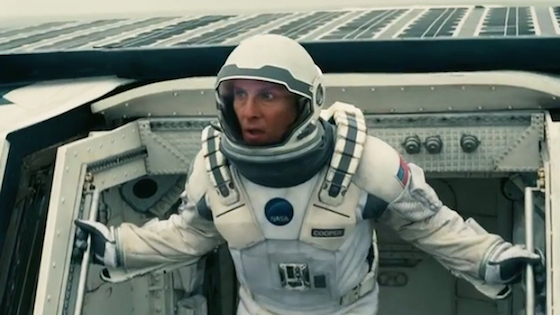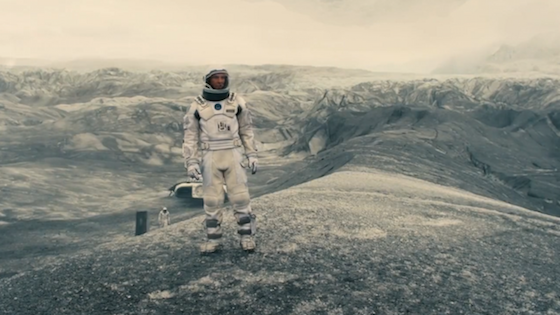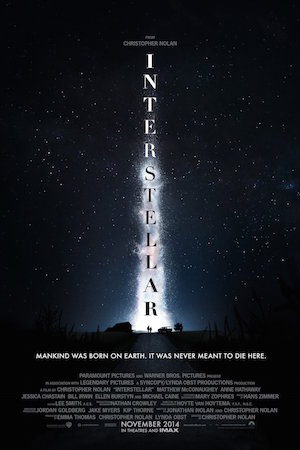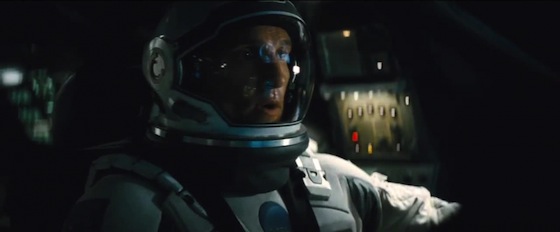We’ve entered an era of filmmaking in which each media-ordained, great-filmmaker must out space opera his or her colleagues. Writer, director, producer Christopher Nolan throws his oversized hat into the galactic opus ring with Interstellar, a film so huge in scale it threatens to crush any opposition to its grandeur.
Interstellar is big. Shot on a mixture of 35mm and 70mm film, Nolan’s motion picture is awash with visual texture. The sheer technical feat that is Interstellar is impressive.
Nolan also fills the ranks of his latest film with an exceptional cast. Matthew McConaughey plays Cooper, a pilot turned farmer in a neo-dust bowl America. Anne Hathaway and Michael Caine play Amelia and Professor Brand, the father daughter scientist duo who pull Cooper away from his farm, son and daughter to search the stars for another celestial home.
Jessica Chastain plays the adult version of Murphy, Cooper’s daughter who chases her father’s dream into the stars. Casey Affleck plays Tom, Murphy’s earth-bound sibling. Matt Damon, Topher Grace, John Lithgow, and Ellen Burstyn all get supporting roles.
The performances are as great as one should expect from such a capable cast. Often a character will pull you in emotionally through the sheer force of an actor’s will.
And that’s the problem.
Christopher Nolan is getting pretty pictures and great actors to shine up his turd of a premise until you are forced to proclaim him a master of the cinematic arts.
If you haven’t seen Interstellar, and want to, read no further.
The driving premise in Interstellar is that only through the intangibility of love can we solve our problems. Whether this is through the belief in a benevolent spirit, or that the love between a father and daughter or two astronauts can transcend space and time and can give us specific answers when reason fails. This sounds beautiful, but it’s not just a flawed premise, it so wrong that on some level everyone knows it’s wrong.
Love can be a motivation. Love can be necessary. Love can make the pain of the world around us bearable, but love cannot solve math problems. Love cannot rewrite physics. It’s just a really stupid idea that Nolan puts forth.
Let’s take a look at Contact. It’s a flawed film for sure, but its premise is similar with one enormous difference. Ellie Arroway is motivated by love and the loss of her father at a young age, but that love doesn’t preclude difficult choices and a reliance on scientific study to achieve or rethink her goals. In fact McConaughey’s Palmer Joss makes a clear distinction between science, knowledge, and faith. He also makes a compelling argument for both knowledge and faith, and that sometimes we must rely more on one than the other.
In Interstellar love is not only the answer, it will lead to the answers. There are two unbearably wooden speeches, one from Hathaway and one from McConaughey that profess love over science. Our science is limited and our love is boundless.
Again this is just beautiful hogwash. What we believe, and the love that drives us can be the fuel, but it is just a huge fireball unless controlled by the engine of thoughtful choice and rational actions.
If we walk out of the theater, and accept that only love can solve our problems, then what does it mean when we still have problems? Have we not loved hard enough? This is the line of questioning that exposes Nolan’s premise as not just misguided and stupid, but mean and hurtful.
So Nolan’s premise is garbage. So what? Lot’s of fun films have silly or sloppy premises.
 Storytelling Is a Path with Many Branches, Not a Slide
Storytelling Is a Path with Many Branches, Not a Slide
For a story to really grab you and hold on to you, for it to stay in your brain for years, the characters must be forced into difficult choices. This creates the stakes. The fears of a character, their flaws, will mold their choices. These choices should bring about consequences and the viewer should know that had they made a different choice the outcome would have been better or worse.
For instance, a daughter in peril can be saved by her father, but will be severely injured in the process and will forever blame the father for the injury. What is this father to do? There is no easy answer, and this might make a solid setup for a story.
In Interstellar never once does any character have to make a choice at all. It’s like watching a marble roll down a windy path. It might offer a fleeting entertainment, but we always know where the marble will start and where it will end. Never once does the journey make us question, why or what if.
I’ll offer some specific examples.
Cooper leaves Earth, because it’s his only means of saving his family. No choice, even though leaving is hard.
The mission takes them to a planet where they lose so much time and fuel due to the effects of relative time shift that the must go to only one other planet. Amelia makes the choice based on love and not science, Cooper trumps her decision. No choice here, because Amelia doesn’t break any rules or disobey. It’s discussed, it’s over. Things happen because Nolan has ordained the pathway.
When they get to Dr. Mann’s planet, Mann sabotages all options. All they have left is to make it to the third and final planet. There is no possibility of making it home. The sacrifices that TARS and Cooper make to ensure Amelia’s success are not sacrifices. Only one option is not a choice. There are no stakes, and the characters simply act out the will of the author.
 Then beautiful and benevolent filmmaker, unable to allow his characters to slip into the oblivion of a singularity, sweeps in with the downy touch of a deus ex machina, a fifth dimensional race of beings who save Cooper and give him all of the solutions to the puzzle. He must transmit the signal to Murphy through her bookcase, the dust on the floor and finally through her watch. No on screen character solves the problem, accepts the pain of the inevitable, transcends their own limits, or suffers the lasting consequences of their actions.
Then beautiful and benevolent filmmaker, unable to allow his characters to slip into the oblivion of a singularity, sweeps in with the downy touch of a deus ex machina, a fifth dimensional race of beings who save Cooper and give him all of the solutions to the puzzle. He must transmit the signal to Murphy through her bookcase, the dust on the floor and finally through her watch. No on screen character solves the problem, accepts the pain of the inevitable, transcends their own limits, or suffers the lasting consequences of their actions.
Nope Cooper was just in the right place at the right time, and the right fifth dimensional beings solved everyone’s problems.
This is storytelling at its worst.
Unfortunately it comes in a very attractive package and Christopher Nolan thinks you’re too stupid to realize it.
I know and have faith that you’re much smarter than that. My love of you, you precious cinematic devotee, motivated me to craft this article with clear thought and heaps of evidence from the film itself. Make the difficult choice and transcend the bonds that Nolan seeks to place upon you.









{ 3 comments }
To me, the greatest stretch was that the 5th dimension beings are “us, in the future.” I was surprised Nolan didn’t complete the thought and have McConaughey ultimately become the 5th dimension being that transcends time and saves the day rather than going straight to the ending we all saw coming from the tearful goodbye early in the film. As it drew to a close, I kept thinking of comparisons to M. Night Shyamalan’s _Signs_ (and every film he’s made since).
On the film as a whole, it’s a visual masterpiece, but who mixed the audio and who did the quality control to let it go out like this??? There are several scenes where the score is so loud you can’t hear the dialogue. It’s fine during the rocket launch sequence where all the sound effects covering the dialogue adds to the realism, but there were moments when a PIPE ORGAN was drowning out the dialogue. That makes no sense at all.
David,
Thanks for the comment. You’re not the first person I’ve heard compare Interstellar to a Shyamalan film, a comparison which I don’t take as flattering. Nolan himself does rely too heavily on a twist or force epiphany in almost every film, so I agree with the approximation.
As far as the music, Nolan and Zimmer often try to extrude emotion with their use of music. I don’t know that this is a new phenomenon.
You’re not the only person who’s compared it to Contact, however my comparison started out something like, “Not since Contact have I experienced such a terrible movie….” You’ve touched on just about every point I had, except for a few things at the end, like how they essentially solved the dying earth issue by building a space station, so it appears that all of the work in the previous 3 hours of the movie was unnecessary and the fact that after 80+ years he finally reunites with his daughter only to be told by her that he should go find Ann Hathaway. WTH, I would NEVER have left my daughter in that situation, especially if she were dying.
Comments on this entry are closed.